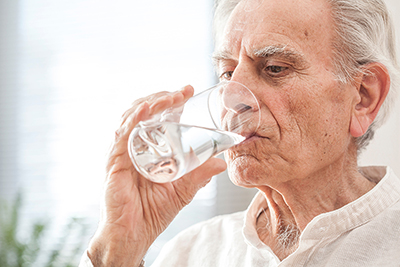The Lifesaving Elixir: The Importance of Proper Hydration for Health and Older Adults
Wed, Sep 6th, 2023
Water, the elixir of life, plays a pivotal role in maintaining our health and well-being. It is a fundamental necessity for every living organism, and yet, its significance is often overlooked. Proper hydration is crucial for people of all ages, but it becomes even more vital as we age. In this blog post, we will explore the importance of staying hydrated, how it affects overall health, and why older adults should pay special attention to their hydration needs.
The Essence of Proper Hydration
Water is the cornerstone of life. Our bodies are composed of approximately 60% water, and nearly every bodily function relies on this precious resource. From regulating body temperature to aiding digestion, from delivering essential nutrients to removing waste products, water is the unsung hero behind the scenes.
Maintaining Body Temperature: Sweating is our body's natural cooling system. When we're dehydrated, this system becomes less efficient, making it harder for the body to regulate temperature. This can lead to overheating, heat exhaustion, and in severe cases, heatstroke. Digestion and Nutrient Absorption: Water is vital for the breakdown and absorption of nutrients in the digestive system. Dehydration can lead to constipation, as well as hinder the body's ability to absorb essential vitamins and minerals.
Joint Lubrication: Proper hydration helps keep joints lubricated. Inadequate hydration can exacerbate joint pain and stiffness, which is particularly relevant for older adults who may already experience age-related joint issues.
Cognitive Function: Dehydration can impair cognitive function, leading to reduced concentration, memory problems, and mood disturbances. These effects can be especially concerning for older adults who are already at risk for cognitive decline.
Hydration and Aging
As we age, our bodies undergo various changes that can affect our hydration needs. Understanding these changes is crucial for older adults to maintain their health and well-being.
Reduced Thirst Sensation: One of the key changes associated with aging is a decreased ability to sense thirst. This means that older adults may not feel thirsty even when their bodies are in need of hydration. Therefore, it's essential for older adults to consciously monitor their fluid intake.
Kidney Function: Aging can also lead to reduced kidney function, affecting the body's ability to conserve water. This makes older adults more susceptible to dehydration.
Medications: Many older adults take medications that can have diuretic effects or affect fluid balance. It's crucial for them to be aware of these side effects and adjust their fluid intake accordingly. Loss of Muscle Mass: Age-related muscle loss, known as sarcopenia, can affect the body's water content. Muscles contain a significant amount of water, so a decrease in muscle mass can reduce the body's overall water content.
Chronic Health Conditions: Older adults are more likely to have chronic health conditions that can impact hydration, such as diabetes or kidney disease. Managing these conditions while staying properly hydrated is essential.
The Consequences of Dehydration
Dehydration is not to be taken lightly, and its consequences can be severe, especially for older adults.
Cognitive Impairment: Dehydration can lead to confusion, memory problems, and difficulty concentrating, which can be mistaken for signs of dementia in older adults.
Falls and Fractures: Dehydration can cause dizziness and weakness, increasing the risk of falls and fractures, which can be particularly dangerous for the elderly.
Kidney Stones: Inadequate hydration can lead to the formation of kidney stones, which are not only painful but can also result in further kidney complications.
Urinary Tract Infections: Older adults are more susceptible to urinary tract infections, and dehydration can increase this risk. Constipation: Dehydration can lead to constipation, a common issue for older adults. Chronic constipation can have a significant negative impact on quality of life.
Tips for Staying Hydrated
Now that we understand the importance of proper hydration, let's explore some practical tips for older adults to maintain adequate fluid intake: Set a Schedule: Older adults should establish a routine for drinking fluids, even if they don't feel thirsty. Aim to drink water throughout the day.
Monitor Medications: Be aware of any medications that may increase fluid loss or affect thirst. Consult with a healthcare provider if you have concerns.
Eat Hydrating Foods: Incorporate fruits and vegetables with high water content into your diet, such as watermelon, cucumber, and oranges. Limit Diuretics: Reduce or avoid caffeine and alcohol, as they can have a diuretic effect, increasing fluid loss. Use a Reminder: Set alarms or use smartphone apps to remind you to drink water regularly.
Proper hydration is not just a matter of comfort; it's a matter of life and health. Older adults, in particular, should pay close attention to their hydration needs due to age-related changes and potential health risks associated with dehydration. By staying vigilant and following the tips mentioned in this blog post, older adults can ensure they are properly hydrated and enjoy a higher quality of life, improved cognitive function, and better overall health. Remember, water truly is the elixir of life, and it's never too late to make hydration a priority.
Please keep in mind that there are certain medical conditions where fluid intake needs to be controlled by your physician. Talk to your doctor before making any changes with your fluid intake.






